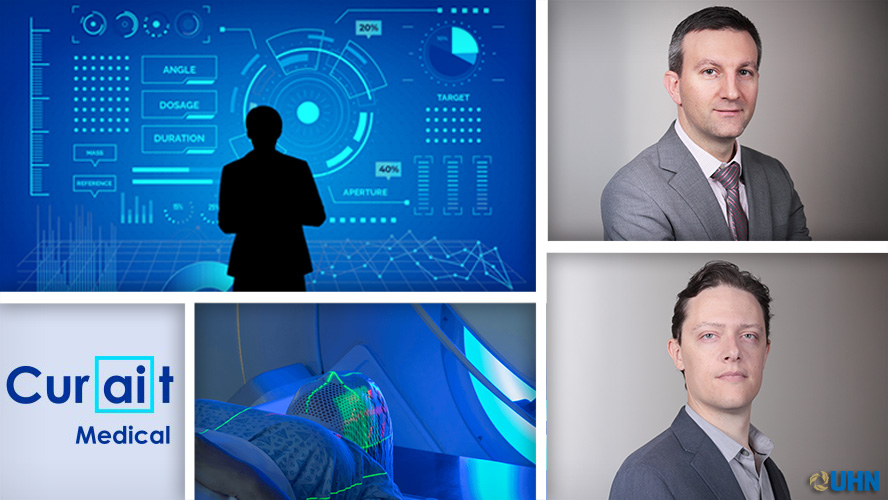
Nearly half of all cancer patients receive radiation therapy as part of their disease management. Radiation therapy requires extensive planning and considerable resources by the specialized radiation medicine team to ensure it is safe and effective. Curait Medical, a new radiation therapy company, has developed a patent-protected platform based on technology developed at UHN that leverages AI to speed up and optimize the radiation treatment process.
Radiation treatments are individually customized to ensure each patient receives the right amount of radiation to target tumours while preserving a patient’s healthy tissues. The radiation treatment planning process is complex, typically requiring hours to days for each patient. Curait’s AI technology evaluates thousands of radiation treatment factors in minutes, providing real-time consultation to expedite treatment. This technology ensures radiation treatments are of the highest quality and are consistent with established clinical practice guidelines based on objective clinical evidence.
Curait Medical was launched earlier this fall based on research and development at UHN’s Princess Margaret Cancer Centre (PM) and was incubated at UHN with the guidance of the Commercialization at UHN (link is external) team.
Curait’s co-founders, Dr. Thomas Purdie, a Clinician Scientist at Princess Margaret Cancer Centre, and Dr. Christopher McIntosh, a Scientist at Toronto General Hospital Research Institute (TGHRI) and Chair in Medical Imaging and Artificial Intelligence at the Joint Department of Medical Imaging, bring expertise in clinical radiation oncology automation and AI for enhanced patient care, respectively.
“My research has largely been driven by the idea of leveraging automation through machine learning to improve patient care,” says Dr. Purdie. “By developing and applying AI to radiation oncology, we can streamline complex processes like treatment planning and reserve valuable clinician time for direct patient care, where it’s needed most. It is gratifying to know that these advancements can make a tangible difference to both patients and providers.”
Curait’s platform, pending regulatory approval in the US and Canada, was trained on world-class clinical radiation therapy treatment data from Princess Margaret Cancer Centre to learn what makes a high-quality radiation treatment plan as well as the best personalized treatment for each patient. It is therefore able to look at any new proposed radiation therapy treatment plan and assess whether it is well suited for the patient, and where applicable, provide specific feedback to help health care providers improve the plan.
Curait has also developed a retrospective application that allows hospitals and administrators to review the quality of treatments they have already provided to their patients to ensure quality consistency over time, across different locations and providers. Researchers and clinical trial administrators can also use the retrospective application to measure and ensure consistent radiation treatment quality across trial sites.
Curait’s technology will be applicable to all cancer patients requiring radiation treatment with the ability to be easily integrated into other health care applications that benefit from objective quality evaluation and real-time consultation. With its commitment to using AI to improve patient outcomes, Curait Medical is poised to make a lasting impact on the future of radiation oncology.
Visit Curait Medical’s website (link is external) to learn more.




